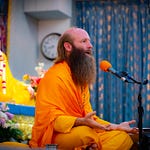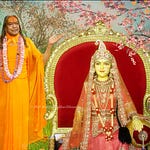My pranam to all of you dear devotees!
I'm extremely blessed to be with you all who are extremely graced and blessed to be present here in this Memorial Weekend Intensive. To have you all present here itself is the greatest blessing of God, and I can't be speaking to the walls. Even if I do so, it's only jad, inanimate. And I can't just be speaking to people on the streets. They'll listen maybe to just a word, and move on. I can only be speaking to the devotees like you all, who are genuine, who are sincere, who have left their luxury homes, and their beautiful, luxurious life where they could eat, drink, and play, go around places, sit on a sofa with hands and legs spread wide watching a TV. But you've chosen today to let go of all those materialistic pulls like those temptations that have always made us move onto the wrong path, which is the material path, where there is no happiness. It has taken us away from our Divine path, from Godhead Personality, who is the embodiment of love, the ocean of love.
Today, you have walked to this path of spirituality by making this choice. You alone have not made this choice, of course. Your greatest merits, and the devotional deeds of your past uncountable lifetimes, the result of this has internally inspired you, motivated you, and pushed you to come to satsang and do sadhana, where you won't get leisure and luxury of home environment.
You'll get the wealth of all the wealth, no doubt about that, but, you know, those materialistic pleasures like what you want to eat today, laddoo, rasgulla (Indian sweets), you can't. Whatever is given to you here, you'll be eating that. Simple mahaprashadam (sacred meal). And you'll be sitting here in this sadhana where I'm going to reveal to you all about the rules and regulations that need to be followed, the discipline, and strict maun sadhana. This is a vow of silence. Thus, knowing this, you have come here. So this is indeed your greatest of your puny, devotional merits, and also the grace of God and Guru. Without grace, everything would be nullified; nothing can be materialized. So the greatest grace of God and Guru has brought us all together over here. Very few of the individual souls do earn such devotional sanskars, merits, to be inspired, to be motivated to be in satsang.
So know this for yourself that this is not just a very small sacrifice of the material nature that you have made. It's a very big sacrifice. But this sacrifice is for your atma kalyaan, for the welfare of you, the very you, the soul, and you are the wisest. Thus, know it and do not waste even a fraction of a second when you are in this sadhana retreat. Try to make the most of it so that you can grow deeper, stronger, and earn that much of spiritual grace that may enable us all to attain our goal of life, the purpose of life in this very lifetime. It is possible, but it's up to us. So, once again, my most humble pranams (respectful greeting) to each one of you, most blessed souls.
Let us all fold our hands in the prayer mode, take a good look at the Divine form of God and Guru placed on the altar. Capture the form of the Lord in your hearts and minds and close your eyes. Let us all, once again, pay our most humble obeisance at the Divine lotus feet of our supreme Divine beloved Lord, whose grace alone has brought us this far and whose grace alone will enable us to meet Him one day.
Blessed Souls, eternal and Divine!
We all shall chant the couplets from Radha Govind Geet today first, and then I shall give a brief introduction on this sadhana intensive and the rules and disciplines of our sadhana intensive.
Radhey Radhey Govind Govind Radhey,
Radhey Radhey Govind Govind Radhey.
Names of God.
Avasar beetyo jāt, Govind Radhe. Bhajūmgā Bhajūmgā kahe kab laun batā de.
O my mind! The precious time (of this human life) is running out. Until when will you procrastinate and keep saying, “I will do devotion.”
Avasar beetyo jāt, Govind Radhe. Āj kāl pārason men barason bitā de.
O my mind! The precious time (of this human life) is running out. Thinking you will do devotion later today, tomorrow, and so on, years have gone by.
Avasar beetyo jāt, Govind Radhe. Nar tanu sur dhurlabh hai bhatade.
O, my mind! The precious time (of this human life) is running out. The human body you have is not available even to the celestial gods (they too desire a human body to practice devotion).
Avasar beetyo jāt, Govind Radhe. Kāl lagāyo ghāt neend ko bhagā de.
O my mind! The precious time (of this human life) is running out. Your time is ticking and death awaits you. Stop being lazy and careless in devotion.
Avasar beetyo jāt, Govind Radhe. Is nar tanu men to bigārī banā de.
O my mind! The precious time (of this human life) is running out. You have spent countless lives without God realization. Attain God realization at least in this life.
Dear devotees,
This particular Memorial weekend sadhana retreat is a maun sadhana retreat. Maun means silence, the vow of silence. The vow of silence or maun does not only mean that you put a tape on your lips and do not speak. There are two rules to it. See, the entire creation has got rules; there is law and order. The entire creation goes around with all the rules, the laws and order. If one does not follow the rule, be it in the material world or be it in the spiritual kingdom, then instead of reaping the fruits, the beautiful sweet fruits and getting the benefit, we will incur a loss. And that loss could be a very, very damaging loss. So rules are to be followed no matter which kingdom or area we are in, either the Divine or the maya, the material.
Thus, there are certain rules also of sadhana, devotional practice, the Divine love devotional practice, that under the guidance of Jagadgurutam Swami Shri Kripalu Mahaprabhu, our beloved Gurudev, and the panchamool, the fifth original Jagadguru, of this time and age. This path of devotion, Divine love devotional practice, comes under the practice of raganuga bhakti because Jagadgurutam Swami Shri Kripalu Mahaprabhu is himself a ragatmika Saint. Ragatmika Saints are the Saints who are eternal Saints. It could be Godhead personality descended in the form of a Guru or the world's spiritual teacher as a Jagadguru. Or it could be a nitya siddha Mahapurush, eternal Saint, one of the rasik Saints like Lalita, Vishakha, etc. So under the guidance of a ragatmika Saint, when a devotee practices devotion, Divine love devotion, then that is known as raganuga bhakti. So we are practicing raganuga bhakti, rag-anurag bhakti.
This raganuga bhakti, under the guidance of our ragatmika Saint is known as Divine love devotion practice because it is the highest Divine love Bliss that the individual soul practicing raganuga bhakti is aspiring for. One may not know in this lifetime that one like you working towards the supreme Divine bliss of God. But to be picked up by Godhead personality Himself with His Divine grace and to be brought to the lotus feet in the shelter of Jagadgurutam Swami Shri Kripalu Mahaprabhu, the ragatmika Saint of the highest nature in this life of ours is a pure, clear evidence that somewhere in us lies that raganuga bhakti seed that now needs to be worked on under the guidance of the ragatmika Saint. And we need to reach the highest to Gopi prem bhav, madhuri bhav of love. You may not know it with your mind because we only intellectualize things. We cannot go deep within our spiritual being. Only God reaches there and the Saints, God-realized Saints, the Guru reaches there, and they know the fruit to be given to the soul. So the spiritual fruit that we have received in this life of ours by practicing sadhana here at Radha Madhav Dham under the guidance of Jagadguru Swami Shri Kripalu Mahaprabhu and listening to me, one of the handpicked preachers of Shri Maharaj ji, of course, is an evidence in itself that you all already deserve to be in this path of raganuga bhakti devotion. You and I cannot choose with our minds. We don't have that capability, that ability. Sometime in some life, we have already practiced this, and it was already the devotional practice that was already left somewhere.
So only those souls will be able to participate in this sadhana intensive. So in this sadhana intensive there are two rules: one external and the other internal. One is sukshma and one is sthool. So the external rule is a very important rule; it is the vow of silence to be maintained. In other words, no talking whatsoever at any time during the entire sadhana retreat starting from this evening and going till Monday midday. No talking. If something is extremely important for one to speak about, then write a note, a very small note, and pass it to the concerned person. That's it. Because silence does not only mean ‘no talking’ externally like this, it is also the silence of your mind, The maun of your mind. What is silence of your mind?
Silence of the mind does not mean detachment from God. Silence of the mind means detachment from the world. You’re a physical (being); we are very conscious of ourselves as to who we are physically, and the physical world where our minds are engrossed and attached very deeply, not only since this lifetime, but lifetime after lifetime, since time immemorial the sole reason why the one mind that we have could not get attached to God. It can be attached only at one place. Since it has been attached in the maya world since time eternity, until this day, we have not been able to get it detached from the world and attach it to God.
See, the mind cannot be in a state of pending. It needs to be attached. Either it will be attached in this maya world or in the creator of this world, the governor of this world, the Lord of this world, which is Godhead personality, the Divine beloved. Unfortunate is this situation where we are (as stated in the) Srimad Bhagwatam Mahapuran which states in the 11th canto, 2nd chapter 37th verse,
भयं द्वितीयाभिनिवेशत: स्यादीशादपेतस्य विपर्ययोऽस्मृति: ।
तन्माययातो बुध आभजेत्तंभक्त्यैकयेशं गुरुदेवतात्मा ॥ ३७ ॥
Bhayaṁ dvitīyābhiniveśhataḥ syād īśād apetasya viparyayo ’smṛtiḥ.
Tan-māyayāto budh ābhajet taṁbhaktyaikayeśhaṁ guru-devatātmā.- Bhagwatam 11.2.37
“Since the time eternity, before even when time existed, since the time eternity, (That's why you cannot ask the question, “When?” Since before even ‘when’ existed.) since eternity the soul, when released from the womb of God, averted itself from God and went directly in the lap of embracing maya.”
There are only three tattvas, entities: Supreme Brahm Himself, the supreme Lord, and the two powers or the shaktis of God. One, the inanimate maya, insentient power maya, and the other the sentient power, the animate power, which is the soul. So the soul got averted from devotion to God and fell in the embrace and lap of maya. And it is going on till this day. Only you shall know, not God. Only you shall know when you would wish to go to your original source, the embodiment bliss. Attain Him, love Him, and be drowned in that ecstatic bliss of Maharas ras forever. That's our choice. So sadhana is done to bring back that truth to our minds, to remind ourselves of our origin, to remind ourselves of our purpose, to remind ourselves where we should be heading towards and where we are heading towards.
How can we then correct our mistake? This is what Divine love devotion practice is all about. So we've already made the mistake, and the mistake is that we averted ourselves from God. And now how can we correct ourselves? The same 11th canto second chapter 37th verse of Bhagavad Mahapuran, same verse, states, “The way to correct yourself, to put the wrong right, and to get to the goal of life, to attain happiness in life, is to avert ourselves from maya.”
Do the very opposite. Avert yourselves from maya and go into the lap of God. It's all that is needed to be done and it's taking so long. It's taking so long. Why is it taking so long? Because the rules are not followed. The irrefutable law of God is not followed by us. We try to refute it with our minds and intellects, but it is the irrefutable law of God. Even God cannot refute it, but we challenge it. We go opposite.
Just by following the rules of the Divine, and surrendering to those rules, it will be so smooth and easy to avert ourselves from maya. It won't take a second and we’ll go directly in the lap of God. So we just have to turn away. So this averting ourselves from maya, from this material world, and the relations, objects, things, whatever it could be that your mind is so engrossed in, and attaching it to God does not mean you stop living in the world. Averting yourself from there means getting detached, getting detached from the maya world totally. Detachment, again, does not mean that you stop living in this world. You do live in this world. It doesn't mean that you stop loving anyone in this world. You love, but without losing yourself in it.
You know your rights. You know your aim. You don't get lost and immersed in these worldly loving relationships. Detachment does not mean you don't take care. You take care, but without draining your energy out. You'll take care of everyone, do every duty that you are assigned to do without draining your energy out at all. You'll always be internally one with your beloved, lost in the thoughts of your Beloved. Like the Braj gopis did, like Hanumanji did, like Arjun did. Examples are there in the millions. The gopis are attending to their crying babies; married with children. They've got in-laws, and they are doing all the services required by a daughter-in-law to do towards the mother-in-law and father-in-law. They are also taking care of the entire household chores unlike today in this modern time and age. We have all machines. They didn't have machines to go and sprinkle water in their fields. They had to do it manually. There was no irrigation system that you just switch on and switch off the tap, turn on and turn off. No. Smearing cow dung, an antiseptic, where they cook or throughout the floor of the house. And not just saying to their mother-in-law and father-in-law, “Look, I'm modern and I'm young. You're old. You're older, you go. I'm not gonna take care of you,” no, no. They were in the house with all the rest of their husband's relations staying there, with the brothers, etc., taking care of all the work with so much of love, with so much of care, because they were not draining their energy out, and they were not talking a single word. One thing only can stop all the problems, all the fights in the house. Stop talking unnecessarily.
These gopis were lost in the thoughts of their Beloved, drowned in the love of their Beloved Shri Krishna Shyam Sundar, everywhere and in every aspect. They would see only Krishna. They'd only be experiencing Shri Krishna, so no work was a burden for them. And they were not draining their energy out that they then would become so frustrated and stressed out. No. After all, it's the mind which goes through the emotional feelings of sorrows, miseries, pains and pleasures, joy, etc., and the mind is totally absorbed and immersed in the Lord. And physically they are carrying out every activity with care and with love without losing themselves into it.
So this is what detachment is. We have a very, very wrong notion about detachment. The moment we hear about detachment we say, “Oh! I have to leave this world and go into the jungles?” Well, by doing so, if you can attain Bhagwat prapti, God realization, then all the lions and the tigers should have attained God realization a long time back. Why are they still in the form of those beasts? There's nothing like that. It's all to do with your mind, the detachment.
So maun in the true sense, the vow of silence, means the detachment of the mind from the world in every aspect. And the first thing that starts up with your detachment of the mind from the world is no talking. Externally you don't talk and mentally you don't talk. That's most important. Remember, mentally when you don't talk, of course, it means that mentally you are not thinking about anything. Right? In order to say one word, we have to think, and giving a talk I also have to think. We put in a lot of effort. Suppose you see a person standing in front of you, you say,
“Hey, Ramesh.” Did you put in any effort before you uttered the name of the person?
You may say, “No, I didn't.” Yes! You did! That is the actual truth. Yes, you did! When you saw the person, you thought of the person's name. It has become so natural to you because of the habit from uncountable past lives that you don't even think that you are putting an effort to think.
And then you asked Ramesh,
“Hey, Ramesh, how are you?”
So in order to form that sentence, how are you, again, an effort has been put by your mind to think and then to say, to speak.
“How is your father doing?”
Meaning thereby that your mind has already done the effort of thinking that the father was not well. So how is he now? So now you frame that sentence. Talking needs so much effort, it drains out so much of our energy, I'm telling you. But not talking mentally, not talking means not even thinking about anyone or anything, and externally not even talking, then no energy, no energy. No effort is wasted. No effort needed. No effort is done. What effort do you have to put in not speaking a word? Nothing. But how much effort do you have to put in speaking? Think about it. Seriously. You'll get to know more than what I'm putting in words. Tension. So much tension. Sometimes when you want to speak to a person, you start thinking,
“Hey, how do I address them? How do I say? What do I say?”
And other times you may not know, you may not be aware of what your mind is going through. So maun sadhana, vow of silence, no thinking whatsoever about any of the worldly things. Even if the husband and the wife are there or the parents and the children are present in this sadhana. No talking.
During those days in 1980 when I started doing sadhana under the guidance of Jagadguru Kripalu Mahaprabhu Ji directly, the maun niyam, vow of silence, was a very, very strict rule. So there would be husbands and wives, and we wouldn't know who's whose husband and who's whose wife and who is who. I, till this day, don't know a lot of people anyway. They know me, but I don't know them. Because we were there just sitting and getting absorbed and immersed in ecstatic bliss of God's name. No talking, no thinking of anyone, anything around. We wouldn't leave the Sadhana Hall when Maharaji would come and go for his breakfast, lunch, or dinner, his prasadam. We wouldn't run after Maharaj Ji. Nobody would.
There'd be only one person. When Maharaj Ji would get up to go from the Sadhana Hall to his room, then there would be only one person, the person who would be assigned to do the seva, cooking the food, and serving the food to Shri Maharaj Ji. That person will be the one who would go with Shri Maharaj ji, would walk behind and run when the gate comes to open the gate, and run ahead to go and open the door and start serving. No one doing even the cooking was allowed to be in the kitchen cooking at that time. And like this, we must feel the presence of our Guru and God here.
So everybody who's doing the cooking for the devotees, everyone who's doing whatever chores or duties, they should try to finish it as fast as possible so that the maximum time can be spent by everybody in the Sadhana Hall. And nobody should be talking. Refrain from talking - complete maun try to keep.
In your mind, always keep the thoughts of the Lord while chanting is going on. Keep on singing and keep on doing your roopdhyan, sadhana, while you are doing your little seva remembering the presence of the Lord,
“He's with me. I'm cooking for Him,” and that's it. “I'm cleaning for Him.”
Don't take the sadhana time to do your duties. Try to do the duties when everyone is sleeping or before the sadhana begins so that you can finish all those apart from certain small sevas that need to be done, like cooking, etcetera, during the day. Try to finish it as fast as possible so that you can devote maximum time in doing your sadhana. So silence of the mind, silence of the tongue, no speaking, no talking. This is the only way to bring peace in yourself, to bring peace all around.
No home is without, as I said, anger, frustration, or arguments. Every home has got this fight going on, arguments going on. Not a single house has got complete peace and the one reason is talking. One person says something, another person says something else to oppose it like,
“Keep quiet.”
“You just… No! Why should I?”
When he has said this, she has said,. “I have to correct it!”
Are! Then that person will get angry and then that person will speak and then in this argument there can be fist fighting. There can be anything. There will be so much frustration and anger, etc., and everything's going to harm only you, no one else.
So the external rule regarding your clothing is try to wear decent clothing over here and put on your Radha Shyami, (prayer shawl) etc. Take a vow of silence, etc. Wear your Radha Shyami to always remind you that you are seated in a sadhana hall. Now, “I am not going to be a hypocrite.” Tell your mind that. “I have got Radha nam (name) on me when wearing the shawl, and here my mind is thinking something else when my mind should be thinking only of God, when I should be practicing the vow of silence mentally. And what am I doing here? I'm a big hypocrite! Do I want to be that? Do I want to go to hell?”
Talk to yourself. And if we really are adamant to go to hell and not do sadhana and not meet the purpose of our lives in this lifetime, then there is no need for you to be in the sadhana. The only reason why you are graced and blessed to be in this intensive is to get closer to your Beloved Lord. Your earnings have brought you this far and you need to collect more grace, but by doing the opposite, we are going to lose everything. So we have to always remind ourselves of the external rules. And #1 rule that we need to remember and remind ourselves is a complete maun. So just carry a book if you need to talk to somebody and just write something in it, because if you write a lot and then that person writes back to you and writes (something else), then the maun of your mind is not going on. Only your lips are shut. So that's not gonna work. So don't be under the impression that you can be seated here, and do the chanting, etc., and that will lead you to your purpose, to God realization, that it would start to purify your mind. No! It won't. It can't. So don't be under this delusion. The mind alone needs to practice sadhana. And if the mind keeps running elsewhere, if you do not try to work hard keeping the vow of silence mentally and be strict with yourself, then this grace that has befallen upon us would be all kicked away by us. It would all go to waste.
अवसर बीत्यो जात, गोविंद राधे ।
Avasar beetyo jat…
Time is passing by, life is passing by…
We don't know how many more breaths we've got. So make the most of it.
People say that this world is horrible. It's a nasty world. Don't blame the world. The world is not horrible and fearful. There's a Vedic mantra.
चित्तमेव हि संसार…
Chitt mev hi saņsār…
- Maitrayani Upanishad
Don't blame the world. The world is created by God.
It has to be pure like God. It is. The world is not horrible, nasty nor fearful. It is the other world (of the mind) which we have to be very, very cautious of. Now this is the internal sadhana. Which world? Not the world outside. Not the people outside. It's your mind.
चित्तमेव हि संसार…
Chitta mev hi sansār…
This world, your chit, your mind, that is extremely impure. And to purify it, to cleanse it, we are here to do sadhana. Since time immemorial the mind has collected all this maya filth and become impure. That is why we break the rules of sadhana. The impure mind takes us back to its impure world, maya. And one person starts to talk, then you start to listen. Both are doing great kusang. It's a kusang of the highest degree. When a person speaks, you don't lend your ears and start listening because the impact of it will affect your sadhana. It will affect you. Don't even listen. Anybody starts to come near you and starts to ask where you've come from say, “Radhe Radhe.”
We practice this in Mangarh. Nobody would dare even come near anybody and ask who is who. Those who are very, very old and senior devotees, they have died without knowing anyone. We don't need to know anyone. We need to know our Guru and our God. No one else should come in between. No one else has any right to come in between the soul and the supreme soul God apart from your Guru. So speaking and listening, both are grave kusang. If you say,
“Oh, Didi ji, I'll be here for only two days of maun sadhana.”
Let's say it’s three days. Right? So it's not much. In Mangarh, that is back in India in our Gurudham, when we used to do our sadhana, it used to be one month long sadhana. And that one month would seem like a day to us. We would cry like anything that,
“Oh, God, it has come to an end!”
धूला माखो रे !
Dhoolā makho re!
Roll in the Divine sacred raj (dust) of Braj!
Those days, it was not just sung just because it is sung. No. No. No. It used to come out of the mouths of the devotees, and devotees would roll in bhav (devotional emotion) in the entire hall. We didn't want it to ever end. Nowadays, only two days would seem very long for us to keep maun, but try. Try, and you'll experience the same bliss, so much grace you will receive. In maun you receive every wealth. What you will receive nobody can explain, not even I can explain about it. Only you can experience what maun, what silence, gives us. The silence of the mind from maya and the mind attached, very much active and attached with your Beloved Lord, your beloved God and Guru. Practice and see. Practice. Practice.
अभ्यासेन तु कौन्तेय वैराग्येण च गृह्यते ||
Abhyāsen tu kaunteya vairāgyeṇ cha gṛihyate.
Try to keep this mind fully absorbed, immersed in the thoughts of the Lord. Don't give it even a single moment to think about anyone or anything. Be drowned and drunk, intoxicated, for just these three days and experience it for yourself. It's the highest energy. It's the greatest Divine energy. The grace of the Divine, especially of our beloved Gurudev and our beloved Lord, Radharani, starts to shower onto us immensely. Try to receive that and experience that grace.
So strict external rule and internal rule, your navadha bhakti practice, which includes shravan, kirtan, and smaran. The internal rule - roopdhyan, sumiran. Remember, this is of utmost importance. Out of navadha bhakti, (which is) shravaṇam, kīrtanam, smaraṇam, pād-sevanam, archanam, vandanam, dāsyam, ātma-nivedanam, remember that the three which we are doing here in the intensive, are the main. In every Intensive, we do it. In every satsang we do these three: sumiran, kirtan, and shravanam. You are doing shravan bhakti right now. If it is not Shri Maharaj' Ji’s Divine words, then even one of Maharaj Ji's pracharaks, preachers like I am giving a talk; this is also shravan bhakti, talking about the supreme Divine beloved God's names, poems, attributes, abodes, past times, and associates. The six - Bhagwan nam, roop, gun, leela, dham, sant.
So listen as much as you can so that your heart and mind is filled with those Divine glories that have been glorified by the sages, Saints, or by the elevated devotees. This is shravan bhakti, and kirtan bhakti is chanting the glories of the Lord's name. You yourself are now singing the glories of the Lord's name. Mahaprabhu Chaitanya Dev stated that kirtan bhakti was the predominant one, most important one. But Jagadgurutam Swami Shree Kripalu ji Mahaprabhu states that Mahaprabhu stated this perhaps thinking that when the souls will continuously chant the name of God, then maybe at one stage they may start to think, “Hey, I've been I've been singing Hare Ram Hare Krishna!” Who is Ram? Who's Krishna? “Radhe Radhe!” Who's Radha and Govind? They may get their minds thinking about the Divine God, the Divine Lord, whose name they are chanting.
But JagadGurutam Swami Shree Kripalu Mahaprabhu, giving the evidences of the Vedic scriptures states to us all that out of navadha bhakti - shravaṇam, kīrtanam, smaraṇam, pād-sevanam, archanam, vandanam, dāsyam, ātma-nivedanam - states to us all that it is sumiran bhakti that is of utmost importance. Roopdhyan is a must. Why? Then he gives the reason. Sumiran needs only your mind.
Sumiran or dhyanam is done only by the mind. Kirtanam is done by… anyone want to give a guess or an answer? Raise your hands up. Raise your hands up and tell me. Sumiran bhakti needs only your mind, exclusively your mind. Kirtanam bhakti needs what? Raise your hands up if you wish to give me the answer. Yes. Talk talk it out. Tell me completely. It needs your voice. Only your voice? And your mind. So it must say it completely. (The devotee answers but it’s inaudible.) Very good answer. The kirtanam bhakti needs your mind plus your voice, your tongue, another sense organ. Shravanam bhakti needs what? Your mind plus the ears. So one of the senses is needed. But it is only sumiran bhakti which does not need the usage of your sense organs. - five sense organs and five action organs we've got. Prostrating while you are doing your obeisance, paying obeisance. It needs your body to prostrate with your mind. The mind is a must in every devotional, spiritual action that you do. Whether you're doing kirtanam or you're doing shravanam or you're doing pādasevanam, archanam. Archanam needs your hands, except for sumiran which needs exclusively your mind. So sumiran is of the utmost importance.
Remember that. With that if you wish to employ your senses, go ahead. If you do not employ any of your senses, if there is a person who is mute, dumb, cannot speak, he cannot challenge that saying, “Give me free Bhagwat prapti! You've got a mind, and the mind is the most important thing. So sumiran is the most important thing. Someone is deaf and can't do shravanam. Don't worry. You've got a mind. You can do sumiran.
So sumiran is of utmost importance. So there are three which are very important: shravanam, kirtanam, and smaranam. But of all, remember, sumiran is of utmost importance. So while you are here, always concentrate and focus on roopdhyan and then chant the name of God. So external sadhana, internal sadhana.
Remember this and practice your sadhana, and good luck to all of you. May God bless all of us. May our Guru bless all of us with immense bhakti and with all love and devotion in our hearts for our Beloved that we may be able to reach our goal in this very lifetime. We can do that. We can do this for ourselves.









